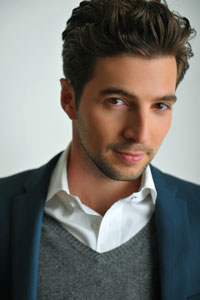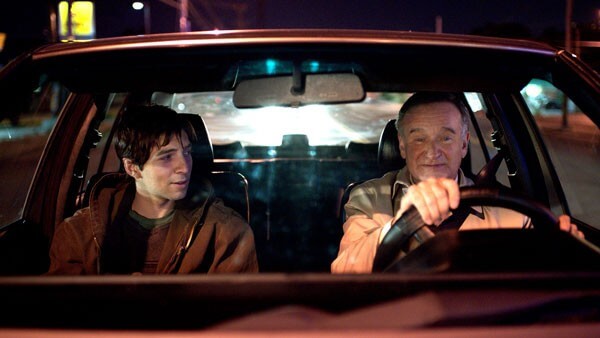The character-driven dramatic film Boulevard features outstanding performances from Robin Williams (in his final on-screen role), Roberto Aguire, Kathy Baker, and Bob Odenkirk, and will be opening in limited release beginning July 10, 2015. Boulevard, directed by Dito Montiel (A Guide to Recognizing Your Saints), follows Williams as a married but closeted bank employee who makes a sudden, life-altering decision when he picks up a young hustler (Aguire) off the street.
With the film heading to theaters, I had the opportunity to speak with Aguire about his character, working with Robin Williams, and how he prepared both mentally and physically for taking on his role in Boulevard.
Roberto Aguire Exclusive Interview:
How did you find out about Boulevard?
“The writer, Doug Soesbe, we have a mutual friend in common. The friend said, ‘Hey, you know, you should take a look at this script. It’s got an amazing character.’ He and I were very close from before, and he said I should try to be a part of it. So I read the script, fell in love with Leo, and called Doug and said, ‘I’d love to sit down and talk about your script.’ We sat down and we had an amazing meeting.
Doug’s hyper-intelligent. He’s funny; he’s so humble and grounded. At the end of the meeting it had just gone so well, he said, ‘I’d love for you to play this character. I’d love for you to play this role.’ Then the rest just kind of tumbled into place. It was amazing.”
On that first reading of the script what was it that drew you immediately to Leo? Was there one thing in particular that was your entry point into this character?
“Yeah, it was the fact that he was an observer. He felt to me like a character who was watching the world happen around him, and I couldn’t understand why. I don’t know. As a human being I think there’s an innate curiosity about what happens around you. I couldn’t understand why he was just sitting there and watching the world happen, and just why he was stuck. Immediately there was this curiosity that I had to find out why.
The great thing as an actor is you get to almost write in the story, it’s a self-fulfilling prophecy. You ask why so that you get to say because. That was really cool to write Leo because why is he there? Well, because life just dealt him this shitty hand and the cumulative circumstances that drove him to this endpoint were just wrong places at the wrong time. I think that for me was a huge draw to the character, to find him and just write him to say, ‘Okay, how are you going to get him out of this and unstuck?’ And how is it going to happen with this other character, who’s kind of broken too.”

This had to be extremely emotionally draining for you. How did you get ready each day to do something this intense?
“Physically, the transformation, Dito [Montiel] and I spoke a lot about how we wanted to really give a realistic portrayal of Leo and his life. Leo’s at a place in life where he’s physically abused, he doesn’t sleep, he doesn’t really eat because he can’t afford to eat, or he forgets to eat because of just the world that he inhabits. Physically getting into the character was a question of losing 35 pounds and a lot of diets and a lot of tortuous months.
Once I got to the weight that we wanted me to be at, emotionally everything just followed. I felt weak, I felt tired, I felt hungry. I felt like I just didn’t have energy to do anything, so that was a really nice kind of slide into who Leo was. Then it was just the question of being as true as I could in that situation, because Robin [Williams] came with his character so fully prepared and fully formed that the minute his character met my character, I was just basically hungry and scared and cautious of everyone around him, and it just exploded into this painfully beautiful relationship that he and I developed.”
That relationship is so fascinating to watch on screen. Can you talk about acting opposite Robin Williams? What did the two of you do in between takes?
“It was brilliant to work with him. He’s one of a kind. He was one of a kind, and he always will be. He was a genius in every regard. He made over 100 movies, so in front of the camera he feels so at ease, and then emotionally he’s so vibrant and present, and intellectually he was bar none, you know? You can’t have a mental tennis match with him without feeling like you’re getting overwhelmed, because he has this ability to switch from one subject to the next with such ease and fluidity that it’s astounding to watch.
To be opposite that in a scene is exhilarating, because you know something amazing is going to happen because you’re playing with someone who’s functioning at such a high capacity, there’s no way that it can’t be magical in that moment. For me, growing up with his movies and being such a fan of his and idolizing him – because he was one of the reasons I got into acting – to find myself there… I remember the first moment I was opposite him, just saying, ‘Tthis isn’t happening. It can’t be that I’m standing here opposite Robin Williams and in a movie with him.’ It was amazing.”
Was there a little bit of nervousness in your first scene?
“Oh my gosh! Yes! I was a bundle of nerves my first scene. I mean, as much as I could with the fact that I felt so weak, but yeah. I walked up to that set just not knowing what was going to happen. It’s that sink or swim moment where you’re suddenly in the big leagues. You’re about to do a scene with someone like Robin Williams and you have no idea how it’s going to go. But the cool thing about him is, going into what we did between takes, he’s just such a generous man and a kind man. Between takes he was making everyone laugh. He was doing accents, and in the movie we have a kid who was in the restaurant with us and they were doing voices and kind of yelling at each other in a really funny way, and everybody was cracking up.
The environment that he creates outside of the scene, and outside of the movie, and outside of this kind of really difficult subject that we were dealing with, he’s so light and it feels so supportive in every single regard, that those nerves melted in a matter of seconds. The minute I was with him, it was just like you’re being taken care of.”
How did you prepare to play a character in these particular circumstances? What did your research consist of?
“I tried to meet with as many people that were in this situation as I could, because there’s nothing like getting it firsthand and hearing people talk about how they ended up that way, or how they chose to end up that way. A lot of them choose to be in that position because of the money, or because emotionally they have something where they want to be removed from people, or they want to feel desired by people.
There’s so many different stories about how you end up in that place. But there was on specific one that I related very much to Leo’s circumstance, which was this one guy who I interviewed. He was really smart. He was very aware of the world that he was in and he said that one day he just turned around and he said, ‘What am I doing here? How did this happen?’ It was so sad to hear that moment because you could hear him almost crying out that he didn’t want to be there. He wanted to be back in the suburban home that he lived in, that he wanted to go back to the life that he had, but for some reason he took this path and now he was here.
I think the most horrible thing about being in that situation is you don’t know how to get out. Suddenly it’s like you choose a door, you walk through the door, and then you’re in a dark room, and then what do you do? When you turn around and you try to find the door again, it’s not there or it’s locked and you’re just stumbling in the dark and there’s no way to get out of the room. The great thing is that Nolan in Leo’s situation comes in, I wouldn’t say with a flashlight but with a little glow stick, so at least they have a little bit of light and they’re both trying to find where this door is.”
Was it easy to get people to open up to you and tell you their stories?
“Yeah, it was actually. The people that I got to interview and got to talk to were more than willing to share their story. It’s interesting, because there’s no shame for what they do. They’re not embarrassed. I think all the shame and embarrassment is society that throws it onto the profession, onto the people, but for them it’s a job. It’s what they do to survive. They’re good at it, they make a lot of money doing it, and it’s their world.
I think that was the most eye-opening thing to see is these people – and by these people I mean hustlers, people in that circumstance, people who prostitute themselves – a lot of them have to do it to survive, especially the ones who I spoke to and they know that. So with that comes this sense of, ‘Well, you know, I’m doing this and I’m doing it because I have to and that’s it. I’m not going to apologize for it. I’m not going to be shunned in my own world or whether society tries to do it to me. I’m going to embrace it and do what I have to do.’ But the sad is thing is that most of them don’t last, whether it’s because they’re using intimacy as such a commodity, as merchandise, that it’s slowly eating them and changing them, and also because it’s a very dangerous world. A lot of them end up dead.”
That’s heartbreaking.
“Yeah, heartbreaking. Exactly.”
What are you working on next?
“I’m doing this project with Olivia Thirlby. I play a small supporting character in it, but it’s this beautiful story about what it’s like ask someone to marry you, and then they get married, and then suddenly to have that moment post-marriage where you don’t really know how to deal with the decision you just made. You’re all nerves and you’re anxious, and you’re dealing with the fact that you just made a lifetime commitment. It’s a really beautiful, realistic view into people and how marriage isn’t always this beautiful, all rainbows and sunshine thing, but it’s also a commitment that’s filled with nerves and angst, and second guesses, and all that. So it’s a really cool project.”







